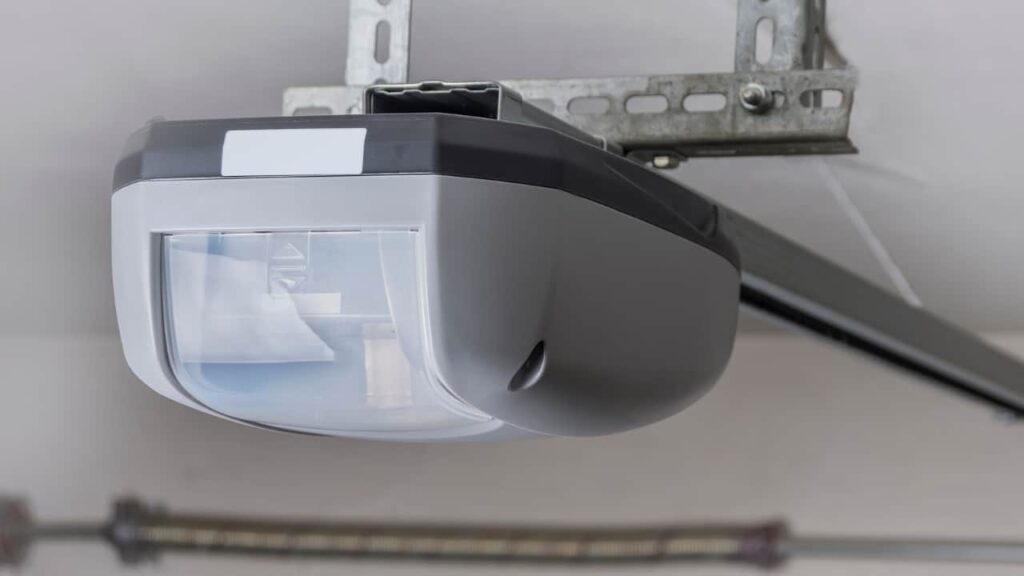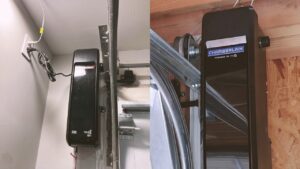As a homeowner, you might struggle to decide which garage door opener is best for your home. With so many options on the market, picking one that suits your needs can be challenging.
Fortunately, you’re not alone in this decision-making process! In this blog post, we’ll break down the five most common types of garage door openers available today.
Read on to find out the specifics!
5 Most Common Types of Garage Door Openers
Garage door openers are essential for anyone looking for a reliable, easy way to access their garage. There are five main types of garage door openers that have become popular over the years:
1. Chain-drive Garage Door Opener
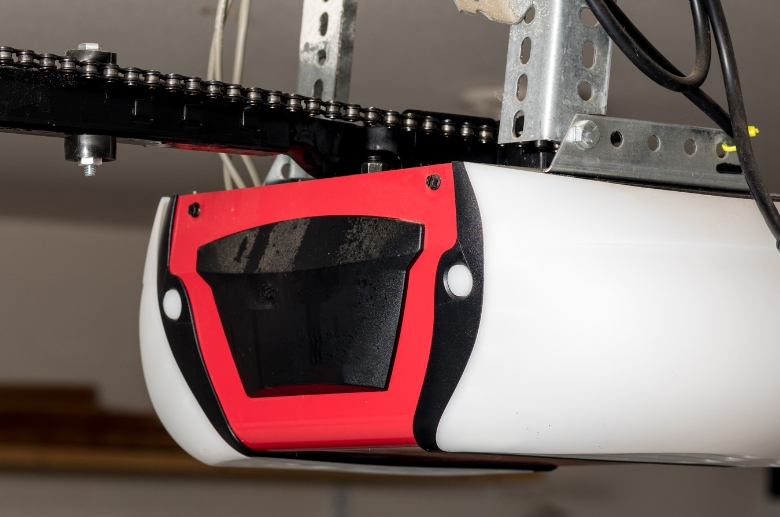
Using a chain-driven garage door opener, compared to other openers, is much like riding a bicycle. Your garage door is raised and lowered by a motor connected to an industrial chain, which pulls a trolley attached to the garage door’s J-bar.
- Best used for/when
Garage door openers powered by chains are sturdy and the most reliable option for large and heavy doors that are frequently used. Therefore, it’s also good for commercial garages with multiple vehicles.
- Average Cost
- Unit Cost: $150 to $250
- Installation Cost: $150 to $300
- Pros
- The cheapest option
The chain-driven garage door is the cheapest option compared to the other four types on this list. - Durable and long-lasting
Despite its price, it packs enough power to lift large, heavy garage doors weighing over 300 to 500 pounds.
- The cheapest option
- Cons
- Some units are noisy
A chain-driven garage door opener makes a clattering sound and vibrations when its metal chains rub against another metal part. - Requires maintenance
Chain drive opener requires frequent upkeep, like oiling, greasing, and adjusting the chains.
- Some units are noisy
Pro Tip: Most chain-driven garage door openers produce noise and vibration. Therefore, it should not be installed in garages near bedrooms. But if the garage door is very heavy and used often, it’s better to look for quieter options that can handle your door’s weight.
Connect With A Garage Expert
Connect with local experts, Compare quotes, Get the best price.
Connect With A Garage Expert
Connect with local experts, Compare quotes, Get the best price.
2. Belt Drive Garage Door Opener
Instead of a chain, the belt-drive garage door opener has a rubber belt that slides on its trolley to open and close the door. It doesn’t create a loud noise without metal-to-metal friction and reduces the opening and closing noise by 20% – 35% compared to a chain drive opener. Fibreglass, polyurethane, and steel-reinforced rubber are the common materials used to make belts.
- Best used for/when
The belt-driven garage door opener is recommended for not-so-heavy garage doors near the bedroom or living room.
- Average Cost
- Unit Cost: $200 to $250
- Installation Cost: $150-$300
- Pros
- It doesn’t produce a loud sound
The belt’s friction and mechanism don’t produce a clattering sound. - Requires less maintenance
With fewer moving parts, it doesn’t require regular readjustments or lubrication.
- It doesn’t produce a loud sound
- Cons
- Less durable
Because of the tendency of its belt to wear off over time, it’s considered the least durable option.
- Less durable
Pro Tip: If exposed to extreme heat, belt-driven openers wear out more quickly than chain-driven models. The belt relies on friction to work, and excessive moisture on the belt may cause it to slip out of place. So, always consider the climate in your area before installing a belt-drive garage door opener.
3. Screw Drive Garage Door Openers
Most openers run at a rate of around five inches per second, but screw-drive garage door openers may go as fast as ten inches per second. The screw-drive garage door opener operates through a threaded rod moving on a trolley. To open or shut the door, threaded rod winds or unwinds a cable around a pulley.
- Best used for/when
A screw-driven opener is a fantastic choice for anybody in search of reliability and longevity. It’s for garages with heavy doors that are near the living space.
- Average Cost
- Unit Cost: $200 to $280
- Installation Cost: $220 to $550
- Pros
- Less noisy opener for heavy doors
It doesn’t operate as quietly as belt-driven door openers but produces less noise than the chain-drive type. Still, it can lift large and heavy doors like its chain-drive counterpart.
- Less noisy opener for heavy doors
- Cons
- Requires regular maintenance
Like chain-drive door openers, most units require regular maintenance, especially lubrication. - Harder to install
Screw drive openers are the most challenging to set up since they need the most precise alignment of the opener’s screws.
- Requires regular maintenance
Pro Tip: You must check your garage door’s weight before browsing for a garage door opener. The seller or manufacturer should specify the maximum weight the garage door opener can support. Make sure to buy one that can support the weight of your garage door.
4. Jackshaft-Drive Garage Door Opener
No belts or chain rails are necessary for this door opener to function. Instead, a motor for jackshafts is installed on the side of the door’s torsion tubes. The garage door opens and shuts through the torsion springs triggered by an electric motor.
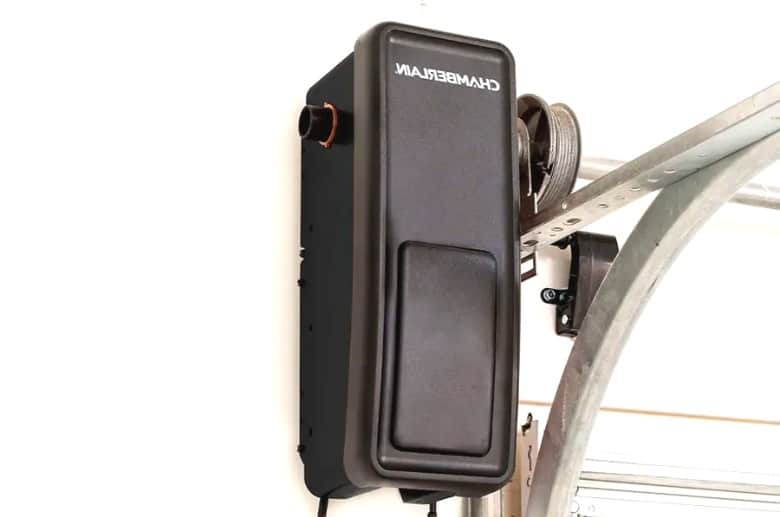
- Best used for/when
It can only be used for sectional garage doors, and it’s recommended for low-headroom garage doors or owners who want to save space and keep their garages neat.
- Average Cost
- Unit Cost: $250 to $500
- Installation Cost: $550 to $640
- Pros
- Requires less maintenance
Since there are fewer moving components, it requires less upkeep compared to ceiling-mounted types. - Very low noise level
These openers are the quietest on the market, comparable with the belt-drive opener. - Frees your garage’s headroom
With a wall-mounted garage door opener, you can utilize your garage’s ceiling space for other purposes.
- Requires less maintenance
- Cons
- One of the most expensive types
With its high-tech features, this type is considered the most expensive option on this list. - Not suitable for tilt-up doors
With its cable mechanism, this type can only be used on sectional doors.
- One of the most expensive types
Pro Tip: Many manufacturers claim that the side-mount garage door opener is “DIY-friendly,” but certain measurements should be considered when installing the system. In most cases, eight inches of wall space on one side of the door and four inches above the torsion bar are required for proper operation.
5. Direct Drive Garage Door Opener
In contrast to standard belt and chain-driven openers, direct-drive openers use a stationary chain while the motor moves along it. It operates smoothly, silently, and with few moving parts.
- Best used for/when
It’s the most efficient option on this list. The direct-drive type is recommended for sophisticated homes with fewer moving parts and quiet operation.
- Average Cost
- Unit Cost: $270 to $450
- Installation Cost: $220 to $550
- Pros
- Requires less maintenance
It doesn’t need any lubrication, requiring minimal upkeep. - Quietest Type
Most models are quieter than the belt-driven opener.
- Requires less maintenance
- Cons
- Limited availability of parts for repair
Fewer models are available on the American market.
- Limited availability of parts for repair
Pro Tip: Being one of the most expensive options, it’s important to note that direct-drive garage door openers have limited availability, and it could take time to find the right parts for replacement. Therefore, it’s better to have a warranty from your installer instead of installing it yourself.
Connect With A Garage Expert
Connect with local experts, Compare quotes, Get the best price.
Connect With A Garage Expert
Connect with local experts, Compare quotes, Get the best price.
Other Types of Garage Door Openers
In the past, garage door openers were typically straightforward. However, garage door openers have become increasingly sophisticated in the Internet of Things era. Modern garage door openers are quieter, more durable, and integrated with smart features.
Here are some of them:
Smart Garage Door Openers
A smart garage door opener uses your home’s existing wireless network with sensors on the door’s rails and a controller to send data to a smartphone.
Wall Mounted or Wall Switch Operators
Wall-mounted garage door openers are connected to the torsion bar that holds the door up rather than a rail track. Vertical garage doors and regular and high lift doors are all suitable for these systems.
Hoist Garage Door Openers
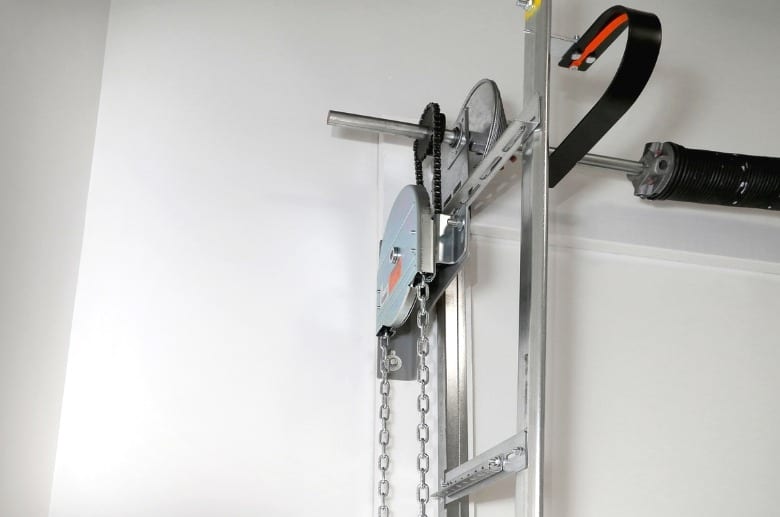
The hoist operator is often mounted on the wall when paired with large sectional garage doors with a vertical or high lift. It is mounted on the front of the hood if your doors are grilles or rolling types.
“Quiet” or DC-powered Garage Door Openers
DC garage door openers have a compact and lightweight chassis containing the shafts, bearings, gears, and gearbox. With its electric motor, it opens and closes gently.
Which Garage Door Opener is Best for My Garage?
There are numerous garage door openers on the market, and getting lost in a sea of options is easy. So, you must have a metric or list of factors to consider before selecting the best garage door opener based on your needs and preferences.
Here is a guide to help you:
Noise Levels
There is a wide range of decibel levels produced by garage door openers. To choose the best garage door opener, consider how much noise you can stand when sleeping or relaxing in the living room. Choose between a jackshaft drive and belt drive if quiet operation is necessary. The chain drive system is also available if you can stand the noise.
Security and Safety
Garage door accidents are all too prevalent. Because of this, some garage door openers have safety features like infrared beams, rolling codes, and sensors that automatically open the door when it’s closed. A simple technique to check the functionality of the garage door’s safety measures is to swing an object in front of the sensors while the door is closing.
Load Capacity
Think about how big your garage door is and how often you use it to determine how much weight it can hold. Half a horsepower is sufficient to operate single-wide aluminium garage doors, and a motor with 3/4 horsepower is necessary if your garage door is heavy or large. Always consult an expert to ensure the longevity of your garage door opener.
Side Mount or Ceiling Mount
Garages with high ceilings or those that use their overhead space for other purposes may benefit from a wall-mounted garage door opener. On the other hand, side-mount devices usually don’t allow large doors to move upwards.
As for the ceiling-mounted model, you can benefit from its reliability and longevity. It can lift bigger and heavier doors because they are usually more powerful. On the other hand, a ceiling-mounted opener would take up some of your overhead space.
Garage Door Type
In many cases, compatibility is a huge issue when selecting a suitable garage door opener. The garage door’s size and weight are the first things you have to consider. Some garage door openers might not be able to support the door’s weight. The size can also be an issue for side-mounted garage door openers because of the required space between the door and the device. Always check for these specifications when browsing for a garage door opener.
Price and Budget
The price considerations for your new garage door opener are something only you can determine. Before beginning, set a realistic budget and stick to it. It’s admirable that you’ve developed brand loyalty to a product you’ve used. Choose a well-known brand with a track record, like Liftmaster, Chamberlain, or Genie. Garage door openers are like many other appliances; the cheaper ones may not be as reliable as the more expensive ones.
Connect With A Garage Expert
Connect with local experts, Compare quotes, Get the best price.
Additional Features
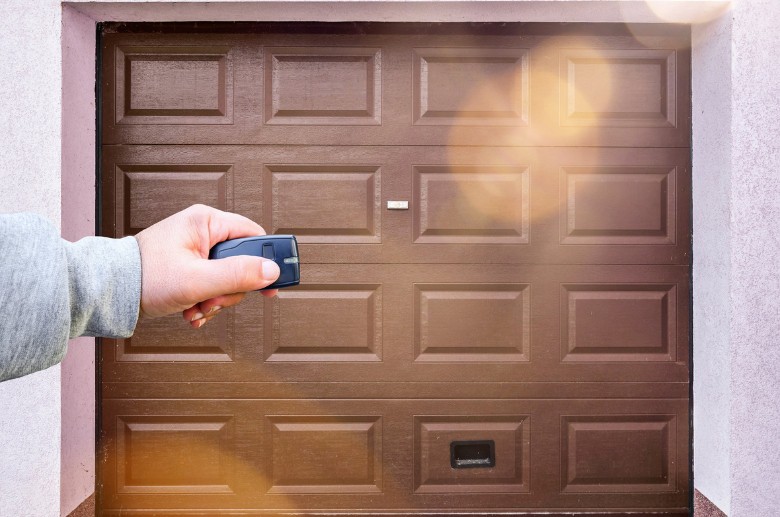
For tech-savvy owners, consider what extra features would make your life more convenient. Some garage door openers may be controlled remotely using a smartphone app or a dedicated remote, thanks to their internet connectivity. Some models have entrapment sensors and rolling code security to avoid mishaps with garage doors. When checking for additional features, you must check if the garage door opener is compatible with your current home technologies, brands, and models.
Warranty Information
While garage door warranties vary widely regarding particular coverage limitations, high-quality brands are almost always backed by warranty protection. However, the details of that protection may vary widely depending on the manufacturer. It’s essential to clarify the warranty service with your installer. Ask for specifics, especially the coverage of the warranty. Does it cover the repair cost? Are they going to replace the entire system? Which parts are included?
Warning: DIY installations may void the warranty on your garage door opener.
Final Words
A garage door opener is an investment that can affect your quality of life. Find the one that fits your budget and gives you the most value and convenience.
So, if you’re ready to make a decision, you can give us a call or request a quote so that we can assist you further. May you find the best garage door opener that suits your needs!

